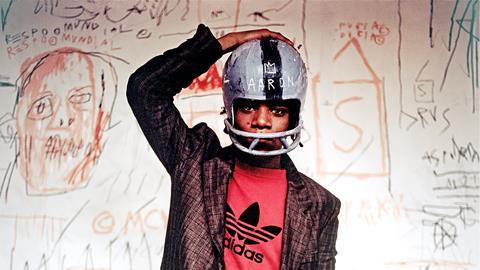“The doc would work well in any slot interested in culture, as well as on educational platforms”
BASQUIAT - RAGE TO RICHES
Distributor TVF International
Producer BBC Studios
Length 1 x 52 minutes
Broadcasters BBC (UK); PBS (US)
At TV markets, one-off documentaries can often get lost in a sea of schedule-friendly docu-series.
But TVF believes that its cut-down version of a feature-length BBC2 doc on the American artist Jean-Michel Basquiat is well worth supporting.
The BBC/PBS co-pro originally aired as a 90-minute fi lm to coincide with last year’s London exhibition of work by the downtown NYC graffiti artist-turned-painter.
TVF subsequently sold this 52-minute version to German broadcaster ZDF/ARTE and retained the distribution rights to the reversion as part of the deal.
“Fewer risks are taken these days with acquiring one-off docs, but we will always support those that we think are worth seeing,” says TVF head of acquisitions Will Stapley.
While Basquiat’s life and art has been the subject of other fi lms, what makes Rage To Riches stand out is the level of access.
Director David Shulman managed to get exclusive interviews with Basquiat’s two sisters – Lisane and Jeanine – to tell their brother’s story.
He also spent time talking to Artestar, which manages the Basquiat estate, to ensure that the original artwork features prominently in the film. The artwork shots remain in the shorter version, with clearance costs covered by the deal brokered by TVF.
While Basquiat was treated like the rock star of the 1980s New York art world, he also suffered from depression and drug addiction, which the film explores.
Even the art dealers featured in the doc now appear more willing to talk openly about that addiction, which led to the artist’s death from a heroin overdose at the age of 27.
There is also commentary about the racism he experienced – Basquiat saw himself as a ‘great artist’ rather than a black one, but prejudice affected the kind of art he produced.
Set to a soundtrack that includes the artist’s favoured hip-hop, the fi lm also walks on the wild side, examining Manhattan’s 1980s postpunk subculture and Basquiat’s relationship with Andy Warhol.
Stapley expects the fi lm’s cool visuals and music to inspire younger audiences, while also pulling in viewers who remember the period. It drew a crowd of 450,000 to BBC2 last October.
Artistic acclaim
Basquiat’s work has attracted fresh interest following the sale of his skull painting for more than $100m last year, a deal that catapulted him into the stratosphere of the international art market.
“The doc would work well in traditional art slots, but also any slot interested in culture, as well as on educational platforms,” says Stapley.
While the shorter version has not yet aired, PBS plans to run the original this autumn as part of its American Masters strand, to tie in with the 30th anniversary of the artist’s death.
Elsewhere on TVF’s Mip slate is French producer Pronto Productions’ 4 x 52-minute Grand Central Stations. The series travels to Mumbai, New York, Cairo and Vladivostok to examine the inner workings of the world’s busiest transit hubs, looking at everything from the architecture to the thousands of people passing through them on a daily basis.
It has also scooped up a series from cinematographer Christopher Doyle, who collaborated with director Wong Kar-Wei on films such as Chungking Express.
In the two-parter China On Film, Doyle narrates a vivid history of the country from the late Qing dynasty through to the communist era, told through the British Film Institute’s China collection.
It’s one of two series from Mediacorp Singapore. The distributor is also behind eight-parter The Asian Century, which uses rare archive material and eyewitness testimony to look at how the continent has shaped the past 100 years.
Factual

Blue-chip pieces include Sir David Attenborough and the Queen’s Green Planet; Keo Films’ ambitious Year of the Tribe and CNN’s six-parter on the Pope
- 1
- 2
 Currently
reading
Currently
reading
Hot Picks: Basquiat - Rage to Riches
- 4
- 5
- 6
- 7
- 8
- 9
- 10

















































No comments yet